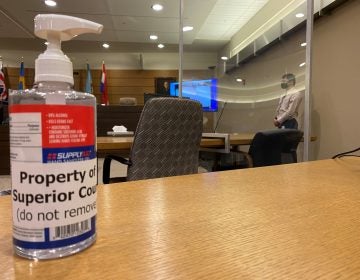Delaware considers ways to reduce prison population to mitigate coronavirus spread
Delaware, along with other states, is taking measures to decrease its prison population as part of the nationwide effort to flatten the curve of coronavirus.

A classroom in the expanded maximum security education building at the James T. Vaughn Correctional Facility in Smyrna, Delaware. (Butch Comegys for WHYY)
Delaware, along with several other states, is taking measures to decrease its prison population as part of the nationwide effort to flatten the curve of coronavirus.
Delaware Attorney General Kathy Jennings said the Department of Justice is engaged in daily discussions with the state’s Office of Defense Services (ODS), Department of Correction (DOC), and the courts to reduce incarceration and detainment rates amidst the COVID-19 pandemic.
Over the weekend, Gov. John Carney initiated a stay-at-home order in response to the coronavirus pandemic. As of Wednesday, Delaware had 119 confirmed cases of COVID-19.
“We are facing an unprecedented crisis in our state, in our nation and in our world, and it’s critically important right now we keep all Delawareans safe and healthy, and everyone is working toward that end,” Jennings said. “We can protect public health without jeopardizing public safety, and striking a balance to make our criminal justice system fairer and more equal for everyone is a topic for daily conversation among our office, the courts, and the Office of Defense Services.”
Delaware already has seen a steady decline in its prison population since 2013, and Jennings said she believes that gives the state a head start when addressing CDC advice to limit large crowds to prevent the spread of the virus.
In 2019, the prison population fell more than 14% from the previous year — from 5,207 to 4,436, while the pretrial population fell 12%.
Since the coronavirus outbreak, Jennings said her department is working to reduce the number of pretrial detainees by ensuring Delawareans aren’t held solely because they can’t afford bail.
“We want to make sure those who do not pose a public safety risk will be able to be released, and we have agreed to file those petitions for release jointly with ODS,” Jennings said.
The courts also have agreed to stop arrest warrants for failure to pay a fine during the pandemic, which Jennings said will also reduce the number of detainees. In 2019, there were about 684 arrest warrants for a failure to pay.
Jennings said Delaware’s criminal justice system could also reduce the detention population by decreasing technical violation penalties, such as violation of probation.
“It is totally fair and just that there be graduated sanctions, including GPS devices, including home confinement…but if someone has a job and is being productive and not a danger to society, it doesn’t make a lot of sense to have those people sitting in jail,” she said.
Jennings added that there are exceptions — including technical violations that are also public safety concerns.
Several other states are also releasing low-level offenders amid the pandemic, including New Jersey, which is temporarily releasing up to 1,000 county jail inmates by order of New Jersey Chief Justice Stuart Rabner. However, Jennings said there’s no determination if that will happen in Delaware, which has no county jails but state prisons instead.
The ACLU has written to Gov. Carney, asking him to release prisoners who are at risk of complications of COVID-19, such as those over 60 or those who have underlying health conditions, if their sentence ends in the next two years. The letter also urges the governor to release those whose sentences end within the next six months.
The DOC can, and already does, advocate for releases when they believe the person does not pose a danger to the public The recommendation then goes to the state Board of Parole and the courts for review.
According to Delaware code, the court may modify someone’s sentence if the DOC can prove the “release of the defendant shall not constitute a substantial risk to the community or the defendant’s own self.” Under the law, good cause for a sentence modification includes rehabilitation of the offender, serious medical illness or infirmity of the offender and prison overcrowding.
“These are Department of Correction-initiated petitions, so they have been flowing to us and they’ve been working hard to determine which inmates can be safely released,” Jennings said.
Part of deciding that release, Jennings said, is making sure the process occurs “with justice,” and having the victims’ voices heard.
A DOC spokesperson could not comment on releasing prisoners but said the department is taking measures to protect those who are incarcerated and prison staff from COVID-19, including enhanced screenings, limiting access to facilities and extra cleanings. If COVID-19 impacts a facility, the DOC has plans in place to isolate that person, as it does with the flu.
WHYY is your source for fact-based, in-depth journalism and information. As a nonprofit organization, we rely on financial support from readers like you. Please give today.


![CoronavirusPandemic_1024x512[1]](https://whyy.org/wp-content/uploads/2020/03/CoronavirusPandemic_1024x5121-300x150.jpg)


